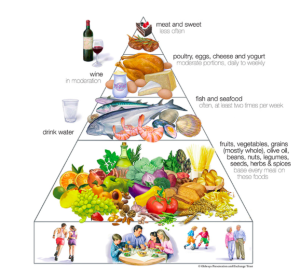Nutritional psychiatry (food as mood medicine) is rightfully taking its place in the mainstream.
I have seen incredible results from using nutrition to treat anxiety, depression, and other mental illnesses. My patients know firsthand how the right nutrients can totally change someone’s mood, energy and mental clarity.
We’re not the only ones.
The Lancet, one of the world’s leading medical journals, recently confirmed the link between the food you eat and your mood. According to their recent article, dietary treatments have been found to be helpful in treating:
- Depression
- Psychosis
- Suicidal tendencies
- Childhood mental health issues
- Schizophrenia
- Bipolar disorder
- Compulsive behavior
- PTSD
In particular, the Lancet article discusses the promising results of the Mediterranean diet, with nuts, in preventing the onset of depression.

Nutritional psychiatry goes beyond the essential foundation of using food as medicine. It includes using targeted supplements to act as mood modulators by themselves, and to increase the efficacy of medication.
Individualized supplementation – using vitamins, minerals, amino acids and essential fatty acids – is helpful in the following ways:
- Correcting deficiencies due to poor nutrition
- Compensating for poor absorption or genetic errors in metabolism
- Reducing inflammation
- Improving the action of neurotransmitters (serotonin, dopamine, noradrenaline)
- Enhancing cell-membrane function
- Growth and repair of nerve cells
- Protecting cells from damage
The Lancet article identifies key nutrients that are particularly helpful in improving mood and brain function. These include:
- B vitamins (with active forms like methylfolate, please!)
- Zinc
- Magnesium
- Sam – E
- Vitamin D
So does this mean that you should run out and buy these supplements? Maybe, maybe not. Remember, individualized medicine works better than any one-size fits all approach.
You also need to be aware that many over the counter supplements are of poor quality. When in doubt, start with the best possible diet you can afford. Then, seek out doctors who are highly trained in nutritional medicine to further customize your diet plan and introduce supplements that are right for your unique picture.
But the main point here is that this is no longer “fringe” or “alternative.” If you and your doctor are not incorporating food and high-quality supplements, you are leaving out a crucial factor in your mental health and wellbeing.
The Lancet piece means that more doctors are becoming aware of the power of nutrition for improving mood and cognitive function. In a world where mental illnesses are on the rise, and threatening to be the biggest health care crisis in the coming years, this is a big deal.
Have you used food and nutrition as part of your wellness game plan? What has worked and what hasn’t?
Reference: Sarris, Jerome et al. (2015) Nutritional medicine as mainstream in psychiatry. The Lancet Psychiatry
Teray Garchitorena Kunishi, ND
Get in touch at http://www.deeplyhappy.com/contact/
Latest posts by Teray Garchitorena Kunishi, ND (see all)
- Racism is a Public Health Threat - June 4, 2020
- The Dark Side of Excellence - April 14, 2017
- A Calling for the Ages - November 10, 2016